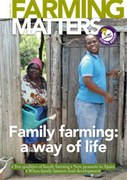In the International Year of Family Farming (IYFF), the AgriCultures Network will be buzzing with activity. The magazines within our network will be exploring aspects of family farming, such as their role in promoting biodiversity and nutrition. Network members will also be involved in many other activities, some of which are highlighted below. And you can participate too, by entering the international family farming photo competition.
AME: Launch of the IYFF
On 22 November 2013, family farmers in India launched the IYFF with the support of the AME Foundation and other organisations. The farmers came from drought-prone dryland regions in Karnataka, Tamil Nadu and Andhra Pradesh. The purpose was not only to celebrate the launch of the year, but also to listen to farmers’ experiences and seek suggestions on how family farming could be strengthened through better policies. KVS Prasad from AME says: “It was great to hear farmers share how the family farms meet their multiple needs, for food, income and nutrition and other needs. They explained how their ecological farms bring down the costs of cultivation and their dependency on external inputs.” The event also marked the beginning of a process to explore enabling mechanisms that support smallholder family farming. Prasad: “It is important that in India, primarily an agriculture-based economy, family farmers are at the forefront of strategies to support communities who deal with threatened livelihoods and ecologies.”
A panel of special guests with diverse backgrounds (academic, research, administrative and civil society) shared their perspectives. They recognised that family farming needs to be strongly supported and observed that present policies have a bias towards corporate agriculture. The need for smallholder extension and LEISA approaches, the use of mechanisms for collective action, the use of existing schemes for creating productive assets, and the importance of shared labour and the system of rice intensification were mentioned as possible opportunities to strengthen family farming.
AS-PTA: Agro-ecology caravans
The National Alliance for Agro-ecology (ANA) in Brazil, in which AS-PTA takes part, is organising a number of “Agro-ecological and Cultural Caravan” tours. In various three-day caravans, farmers, NGOs, research entities and students visit examples of agro-ecological family farms in both rural and urban areas. The programme also includes cultural activities and market visits. During these three days, participants witness the social and environmental impacts of large agribusinesses in the region on family farmers.
The caravans are designed to encourage social mobilisation by showing participants the realities in which agro-ecology and agribusiness are fighting for physical, political and ideological space. The most recent of these tours was held in the urban and peri-urban areas of Rio de Janeiro. Other caravans have been successfully implemented in other states of Brazil. The tours are part of the preparatory process for Brazil’s Third National Meeting for Agro-ecology, which will be held in the first half of 2014. The central theme at this major event will be “Agro-ecological family farming as the social and economic base of the rural world”.
ETC Andes: Documenting a victory
In 2012, the Peruvian congress approved a ten year moratorium on the introduction of GM seeds into the country. The victory of Peruvian farmers and civil society over the powerful corporations that produce and commercialise GMO seeds is a good example of what can be achieved when different stakeholders act together for a common objective. It is not often that the struggle against GMOs is so successful. This has led ETC Andes to analyse, document and disseminate the main lessons from this experience. Teobaldo Pinzas, director of ETC Andes: “Family farmers, organisations and networks in other countries can benefit from this experience and find inspiration from it for their own struggles”.
It is also important to document and disseminate this experience for use in Peru. The struggle against GMOs is far from finished. Two years after the moratorium was announced, the government has taken no further action. There was a plan to evaluate the human health risks associated with GMOs, to review the claims of GMO producers and to implement bio-safety measures. As part of the documentation effort, ETC Andes will produce a 15 minute video in Spanish, English and French.
ILEIA: Towards another system
On February 21 and 22, as part of a large coalition of organisations in the Netherlands and Belgium, ILEIA will host a conference on the transition to fairer and more sustainable food and agricultural systems. Wageningen University will provide the stage for keynote speakers such as Olivier de Schutter, (the UN Rapporteur on the Right to Food) farmers’ leader Hanny van Geel, and agro-ecologist Pablo Tittonell. The conference will open with a session led by indigenous peoples and will also include a variety of workshops and excursions and a series of films about young family farmers in Europe.

